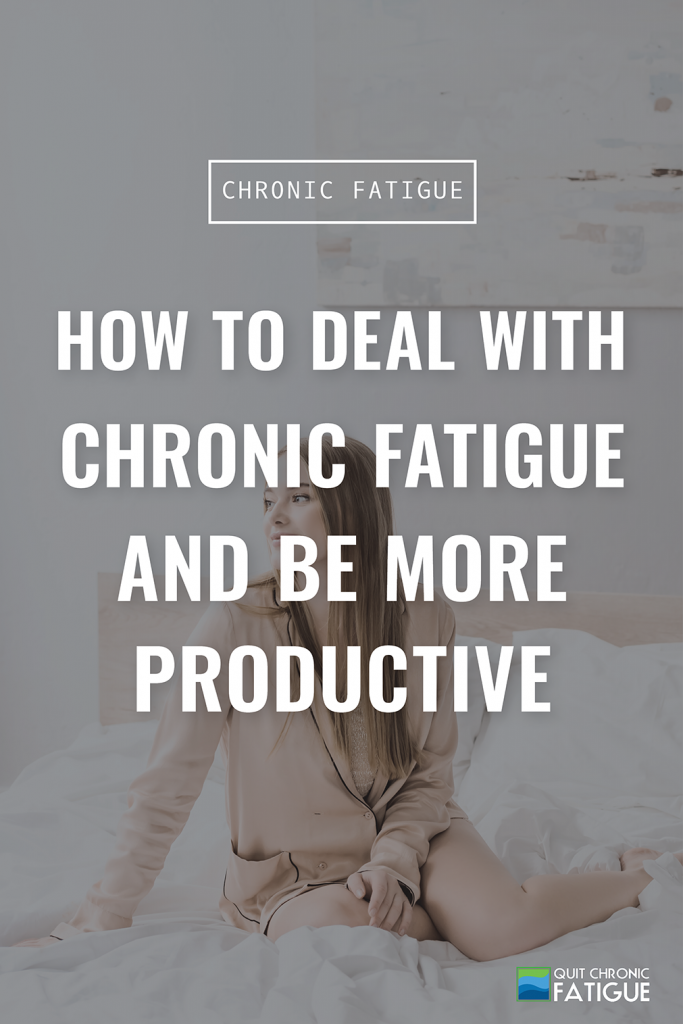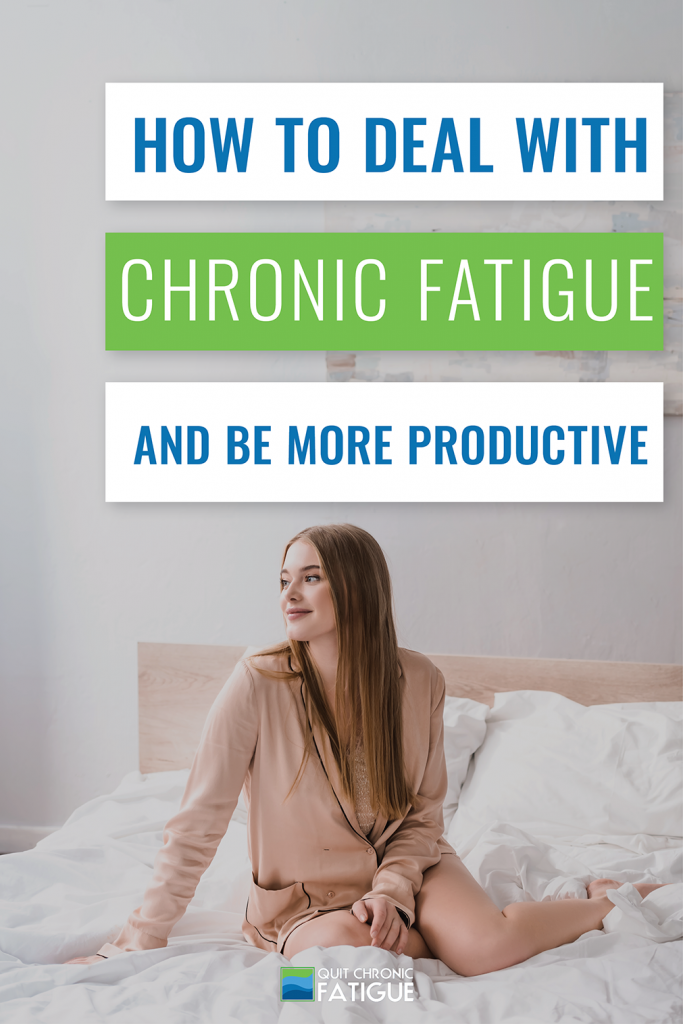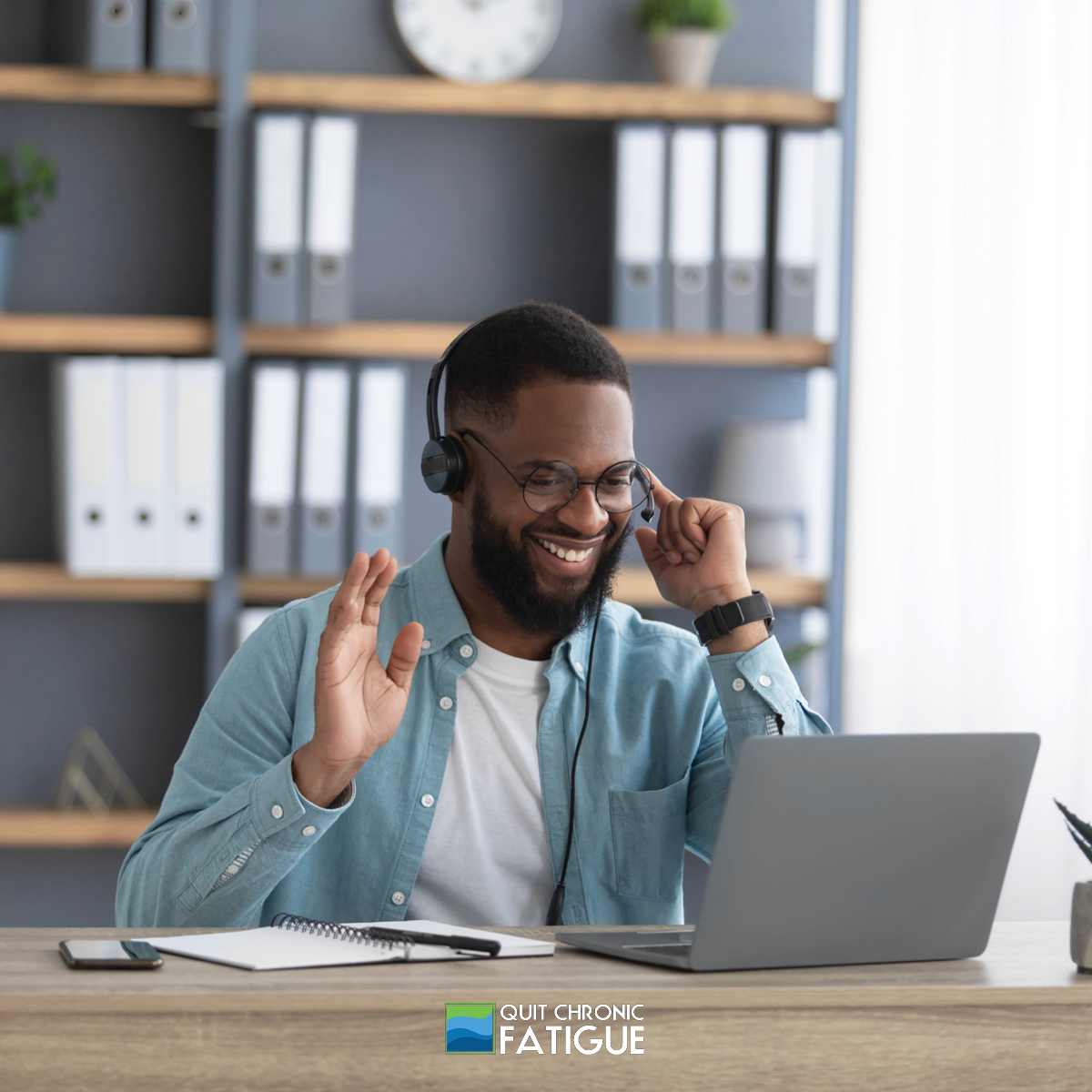With a ton on your plate, being productive is essential! But when you’re facing exhaustion and other symptoms, how do you stay productive and accomplish what needs to be done? Learning how to deal with chronic fatigue is so important.
With any chronic illness, you need to recognize and embrace your own unique limits. From there, you can prioritize and become efficient with your time!

How to Deal With Chronic Fatigue and Boost Productivity
With chronic fatigue, there are so many ups and downs. You might find pockets of productivity in your day only to be exhausted a few hours later.
That’s why knowing how to deal with chronic fatigue is so important.
There are things you need to accomplish each day. These tips will help you balance your health and your productivity! Remember, though: know your limits so you don’t overexert yourself….no to-do list is worth sacrificing your health.
Related: 5 Impactful Natural Strategies for Coping With Chronic Fatigue
Accept That You’re Dealing With a Long-Term Situation
Accepting that chronic fatigue is just that–a chronic illness–is essential to helping you cope. This is a long-term situation, not a short-term problem.
Knowing this will help you face each day with the right mindset so you don’t get frustrated with your productivity day-to-day.
Being productive is hard when you’re exhausted, but staying committed to the big picture helps! Know what your ideal productive day, week, and month will look like, but know that it has to fit into a much bigger landscape of your chronic fatigue diagnosis.
From there, you can focus on building consistency over time.
Learn To Prioritize
Many of us are scared by the important things that must be done. We move the hardest or scariest tasks to the bottom of our to-do lists.
But worrying about a task instead of actually doing it expends more energy than necessary.
Start your day with the most important thing while you have energy! From there, your mindset changes. You’ll feel more accomplished and productive, which will help you get through the smaller tasks on your list. Plus, if you do start feeling exhausted, the biggest tasks are already accomplished.
When you’re thinking about how to deal with chronic fatigue, learning to prioritize is key. But how do you actually do that?
Here’s a strategy!
Write a list of the top five things that you want to accomplish during any given day, week, or month. Split them up appropriately, remembering not to overstack your schedule. After all, if you’re stressed about how much you need to do, you might trigger your chronic fatigue symptoms.
Even if you only spend a few minutes working on that task each day, it’s progress. And like we mentioned above, progress is more important than perfection when it comes to chronic fatigue.
An easy way to prioritize is to evaluate what tasks need to be done now, soon, and whenever. This notepad is a simple tool to use each day to prioritize what matters!
Start Pacing Yourself & Take Breaks
Taking breaks is so important to be consistently productive.
Try to limit your work sessions to 40 minutes and take 20-minute breaks in between.
You may think that taking breaks and stopping potentially good workflows is detrimental to your productivity. But breaks actually make you more productive, and help prevent the symptoms of chronic fatigue.
If you’re wondering how to deal with chronic fatigue, you need to focus on resting before you become exhausted. Planned breaks help you stay in tune with what your body needs.
Instead of pushing yourself to finish your entire list without stopping, conserve your energy by pacing yourself! Even better? Breaks positively impact your physical and mental health beyond your chronic fatigue.
Pacing yourself while working is always helpful, even for those without chronic fatigue. If you’re struggling to accomplish something or solve a problem, a break helps you refresh your outlook and come back creative and productive.
As long as your body’s energy is not low, moving around during a break is also beneficial.
Switching from a mental activity to a physical one can be just as helpful as laying down to rest! Even simple activities like tidying the house or washing dishes can be relaxing and help you maximize your breaks in effective ways.
Create A Routine
Creating a consistent routine prevents decision fatigue that happens when you’re always tired.
With simple morning, workday, and night routines, you don’t have to make as many decisions during the day.
Build a simple morning routine with a shower, a balanced breakfast, and sitting down to create your priority list. And as your symptoms improve, you can add to your staple, simplified routines.
When you’re creating routines, focus on eliminating decision fatigue.
Is picking your outfit and getting ready in the morning a challenge? Do as much as you can the night before! Is choosing a priority each day a struggle? Make a major list at the beginning of the week and break it down each night.
Related: How to Actually Avoid Facing a CFS Relapse: Best Tips
Allow Yourself To Rest
While being productive matters, resting when you need to is more important.
Efficiency, not intensity, is the goal. Knowing how to deal with chronic fatigue mostly centers on being gracious with yourself and honoring what your body needs!
A spin on the classic Pomodoro Technique for productivity is a good idea. Switch it up to do what works best for your body!
When a full day of work is too much, focus on just 20 minutes of productivity. By making those 20 minutes truly productive and then resting, you’ll probably accomplish even more than you would have in pushing through for 3 hours.
After 20 minutes of work, check in with yourself. If you need to rest, set a timer for an hour and rest. Once the hour is up, try to work again for another 20 minutes. If you can still only accomplish 20 minutes, that’s fine! Or, if you can accomplish an hour, that’s even better.
Resting guilt-free prevents burnout and keeps your work consistent.
On that same note, don’t forget to reward yourself!
Whether you have worked for 20 minutes, hours, or not at all, rewarding yourself makes rest feel like a celebration and not something to be ashamed of.
Be gentle to yourself! You’re dealing with something overwhelming, and showing up to make an effort is something to be proud of.
Being productive and consistent can be hard when you are exhausted, but it’s not impossible. Knowing your limitations, respecting them, sticking to a routine, taking breaks, and rewarding yourself will boost efficiency and help you heal.
When you’re wondering how to deal with chronic fatigue and be productive, these tips are absolutely essential!





